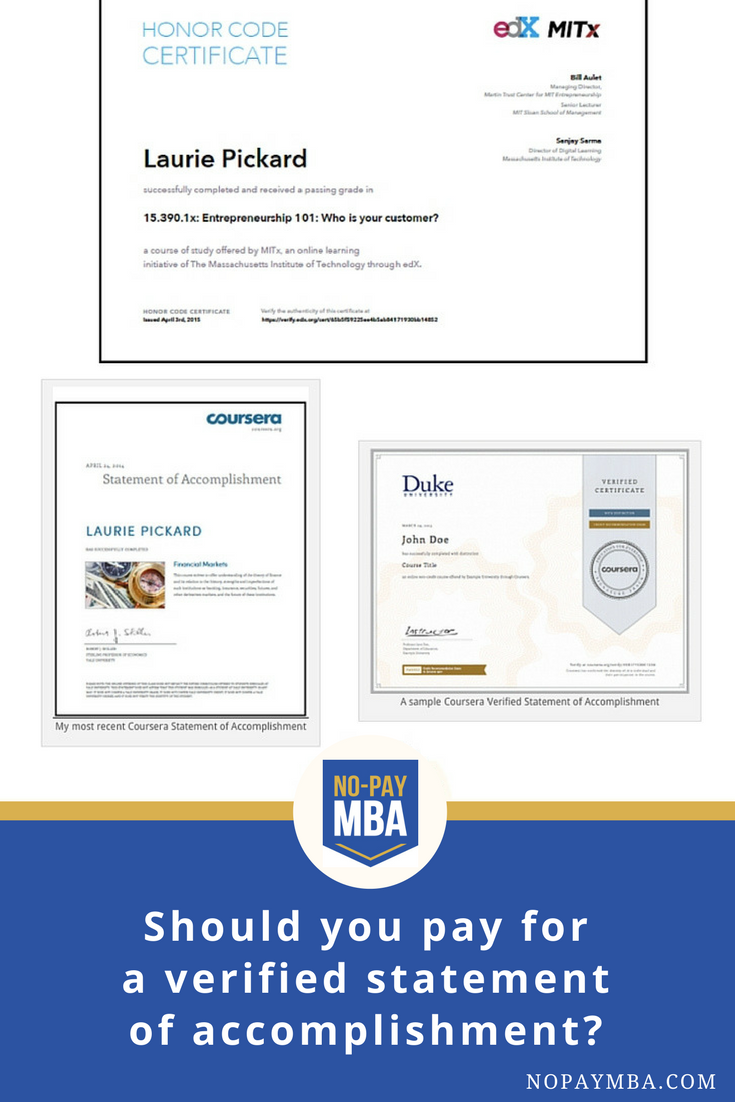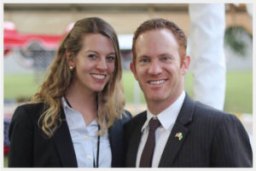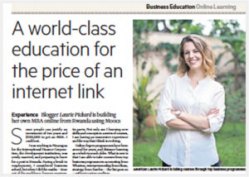by Laurie Pickard | Aug 9, 2013 | MOOC MBA Design
If you aren’t fully convinced that free online degrees are the way of the future, neither am I. I received a tremendous amount of value from both my undergraduate and my graduate experiences, and I wouldn’t trade those experiences in for a free degree earned from the comfort of my bedroom. There is no true substitute for the classroom environment, for realtime exchanges between teacher and student, for lively face-to-face discussion. So I’m certainly not saying there isn’t any value to a traditional MBA. However, given my particular situation, the numbers just don’t add up. For me - and, I would expect, for many others - a free online degree seems like the way to go.
Here is what makes me a good candidate for a No-Pay MBA:
1. I already have a master’s degree. Having a few more letters behind my name might not open any doors that are currently closed to me.
2. I don’t need the B-school network. I’ve been told that a large part of the benefit of attending business school is acquiring a network. I don’t doubt that this is true, but since I already have a professional network, and because I work in a fairly small field not typically filled with MBA grads - international agricultural development - I think I can forgo that perk of attending business school.
3. I don’t want to stop working. When you consider the lost income from the years you spend in school versus working, the price of an MBA goes even higher. Plus, my work will give me a laboratory for applying what I’m learning.
4. I am disciplined enough to finish the courses and willing to explain my approach to others. The fact is, most people who sign up for online courses don’t finish them. Not only that, most courses don’t give credit. So in order for me to reap any benefit from doing a free MBA, I have to be able to both do the work and convince others that I have learned what I say I’ve learned. It’s a tall order, but in part that’s why I am writing this blog - to provide some accountability in my self-made MBA.
5. I have a particular field of interest that isn’t part of most business schools’ curricula. I want to be able to focus my attention on topics connected to international agricultural development - supply chain management, sustainability labeling, sourcing from developing countries, financing for small farms, and other such themes.
by Laurie Pickard | Aug 23, 2015 | Career Development, MOOC MBA Design, Most popular posts

A lot has changed since I last wrote a post on whether you should pay for a verified certificate from a MOOC. If you’re just finding me now, my project is to use massive open online courses – MOOCs – to get an education equivalent to an MBA, at a fraction of the cost of a regular MBA degree. I don’t plan to receive any sort of credential for my studies, but I have sought to publicly demonstrate my efforts and my accomplishments, mainly through this website.
Back when I started my No-Pay MBA, all certificates were free. First Coursera and then edX introduced an identity-verified certificate for a fee, but these two major MOOC providers were still giving away honor-code certificates for free to anyone who completed all the requirements of their courses. At that time, I didn’t see much additional value for an identity-verified certificate over a non-identity verified one. So although I’ve taken over 25 MOOCs to date and have racked up a virtual stack of Statements of Accomplishment and Honor Code Certificates, I haven’t yet paid for a single one .
But things have changed in the world of MOOCs. Coursera is no longer offering free certificates in any of its courses. It’s $49 (or more) for an identity-verified certificate, or no certificate at all. EdX is moving in a similar direction, though in some of their courses it is still possible to get a free Honor Code Certificate. I’m a huge fan of MOOCs and MOOC providers; they’re providing an incredibly valuable service to learners all over the world. Charging for proof that you completed a course seems a smart move on their part. But it does pose a challenge for people like me.
I’ve set my benchmark at $1000 for a complete MBA education. If you’re going to start paying for certificates for every course, the $1000 MBA education becomes untenable pretty quickly. While I’ve called my project the No-Pay MBA, I’m not at all opposed to paying for elements of the world-class education I’m getting. I am, however, very discerning about how to allocate my scarce resources. If you’re taking an entire degree’s worth of courses and you start paying for certs at $50 a pop, (up to $100 for some courses), before long you’re looking at some serious cash. There is a lot I could do with $4,000, and I’m not sure that spending that money on course certificates is the best use of my money.
Last time I posted on this topic, my contention was that employers and most other people you’d want to present with your MOOC-based studies wouldn’t know the difference between the two kinds of certificates. I stand by that assertion, since I imagine it’s unclear even for many MOOC students.
Let me break it down for you. To receive an identify-verified certificate (which is what both Coursera and edX are selling in their courses), in addition to paying for the certificate the student has to prove their identify on each login to the system. This is done using photos taken by webcam and matched to a government-issued ID. Students also log a typing pattern, for subsequent verification.
As I’ve said before, I’m not sure any employers would dig deep enough to know or care about the difference between verified and non-verified certificates. However, if you claim to have taken courses that make you a more valuable employee, they may very well want to see some sort of proof. Regardless of who you’re hoping to impress, I do see some value in having a certificate to hang on your virtual wall, whether that wall is your LinkedIn profile, your resume, or your portfolio here on No-Pay MBA.
So what should you do?
Here is my updated advice for MOOC students in the brave new world of no free certificates.
Get certificates for some, but not all of your courses
If you’re only planning to take a few courses, you may want to get certificates for all of them. But if you’re taking many courses, be selective and choose just a few courses for which you’ll seek certificates. People’s eyes tend to glaze over after looking at about 5 certificates. Once you’ve demonstrated with a small number of certificates that you are capable of succeeding in online courses, you can more easily make the case that you’ve completed other valuable course work for which you didn’t seek certification.
Think in terms of skill sets
Rather than acquiring a random set of certificates for courses that bear no relationship to one another, use your certificates to demonstrate mastery of a skill set. Five intro-level certificates on different subjects are far less impressive than certificates for a series of five courses that build towards mastery. You might want to rely on specializations or series put together by the MOOC providers, or design your own course series.
Pair certificates with work examples in your portfolio
A powerful way to boost the value of any single certificate is to present the certificate alongside examples of the work you have done as a result of your coursework. Increasingly, portfolios are valued more highly than resumes. When you present evidence of your abilities next to your certificates, you make a compelling case that your education means something. The portfolio feature on No-Pay MBA is set up this way for a reason! Choose certificates that you can back up with a tangible project, whether or not you complete the project as part of the course itself.

Use loss aversion to your advantage
People who purchase certificates tend to finish their courses at a much higher rate than those who don’t. There are many reasons why this might be the case; perhaps those people who paid for certificates were more motivated or committed to the course to begin with. But there is also a robust literature in psychology to suggest that people don’t like to pay for something and then not get full value from it, whether or not there is any chance for the money to be refunded. Anecdotally, many MOOC students have commented on this blog that paying for certificates helps keep them motivated. Therefore, if there is a course you really want to take but are worried you might have difficulty finishing, that is precisely the course certificate you should be paying for.
Explore alternative payment arrangements
Coursera offers financial aid to students who make a compelling case that they need help to pay for their courses. Another strategy is to approach your current employer to find out if they would be willing to provide training to you in MOOC form. Fifty or $100 is not a lot of cash when compared to other methods of employee training. Your employer may also be impressed by your initiative, especially if you can tie your proposed course of study to tangible outcomes that benefit the company.
My last blog post on this topic generated a lot of discussion about the value of certificates. If you’ve been following the conversation, or if you’re new on this site, let’s hear your take. Do you pay for verified MOOC certificates?
by Laurie Pickard | Oct 5, 2017
In 2013, I began a public quest to use massive open online courses (MOOCs) to put together my own version of an MBA. I needed a business education to move forward in my career, but after researching the options, I was unconvinced that a $100,000 investment in a traditional MBA would pay off.
When I learned about the existence of free online courses from the world’s top universities, I thought there might be another way to get the business education I desired, at a fraction of the price. I created this website to document my journey and so that others could learn from my experience.
The No-Pay MBA project and the idea that you can get a world-class business education without spending your life savings has captured many people’s imaginations, earning me coverage and references in some major publications, including the Wall Street Journal, Entrepreneur, TIME, and Bloomberg Business.
 The business school admissions website Poets and Quants covered the project in its early days, under the headline “An MBA for under a grand? Seriously!” The article was reposted to LinkedIn and was viewed and shared by more than 500,000 people.
The business school admissions website Poets and Quants covered the project in its early days, under the headline “An MBA for under a grand? Seriously!” The article was reposted to LinkedIn and was viewed and shared by more than 500,000 people.
Through my own self-made business education, I’ve discovered a passion for helping like-minded, enterprising professionals unlock their potential using the tools of the digital age. My new book Don’t Pay For Your MBA (HarperCollins, 2017) distills everything I have learned about constructing a career-launching business education. It is available everywhere books are sold, including Amazon, Barnes and Noble, and IndieBound.
Through my MOOC-based business education I got connected with Class Central, the #1 search and review site for MOOCs. After finishing my business education, I enthusiastically joined their startup team. Working for Class Central has given me the chance to continue to engage with and write about MOOCs and online education, now from an industry perspective. You can see my articles on Class Central here.
 I live in the Washington, DC area with my husband and our twin one-year-olds.
I live in the Washington, DC area with my husband and our twin one-year-olds.
Want to get in touch? You can reach me
here.








